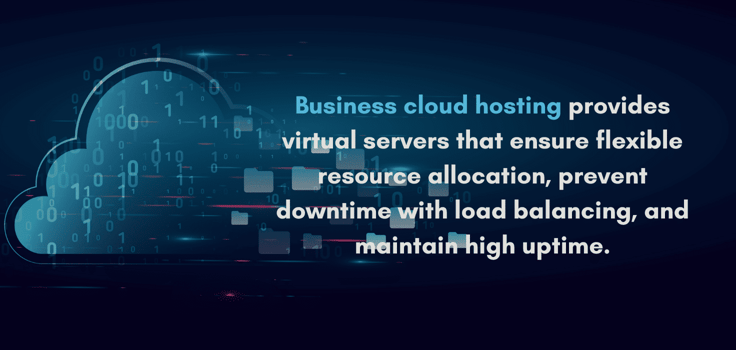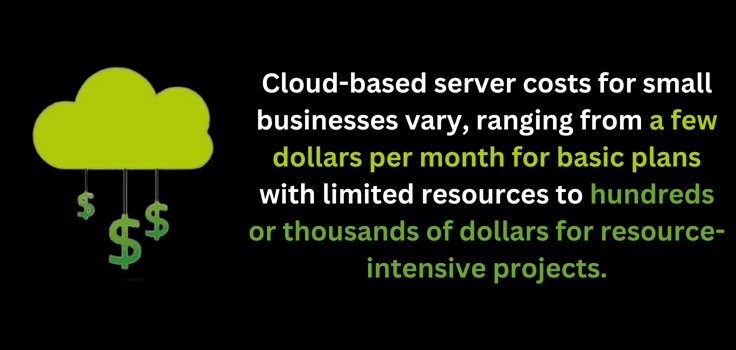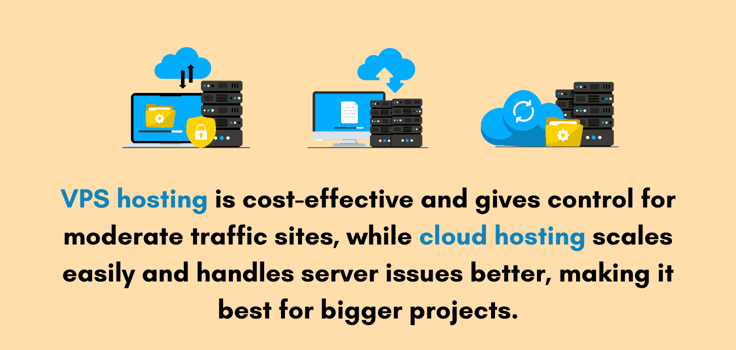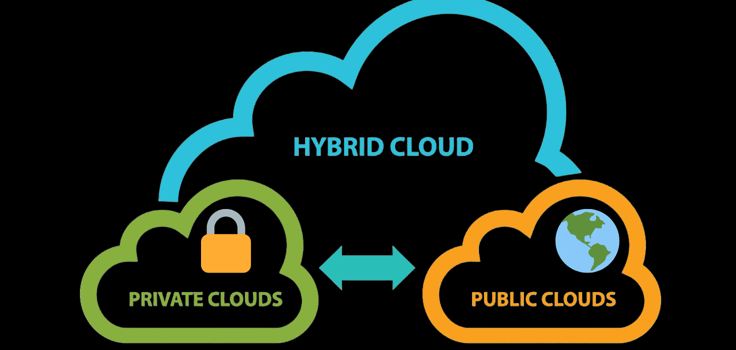
I can’t think of any business that won’t benefit from having a website, especially today. The importance of a website almost feels like a stale topic now.
Today, the real conversation — or rather a point of contention — is not about the importance of websites to businesses but the type of hosting you choose for your website.
Shared hosting is by far the most affordable, which is music to the ears of any businessperson. But if you had to choose between affordability and scalability, which feature would you opt for?
From a business standpoint, I would choose scalability, and that’s where cloud hosting comes in. Today, we’ll look at nine of the best business cloud hosting providers and discuss how they can benefit your business.
1. Kamatera
What’s a business without profits? How do you make profits without eliminating important expenses like web hosting? These are some of the questions Kamatera answers with its cloud hosting plans for business.
For starters, this cloud service provider gives you complete control over the kind of cloud resources your business needs. I’m talking about the number of virtual CPU cores, amount of storage and memory, operating system type, public IP addresses, data center location, and more.
Kamatera.com
- Ultimate scalability with limitless customizations
- Create and deploy servers in 60 seconds
- Easily add load balancers and firewalls
- Stellar 99.95% uptime guarantee
- Sign up today for a 30-day FREE trial
- Get started on Kamatera now.
CLOUD
RATING
★★★★★
Our Review
Starting with more than 60 operating system images to choose from, Kamatera is a strong option for developers who know exactly what environment works best for their project. Customize your cloud server as needed and deploy in less than a minute. Go to full review »
| Setup Time | Disk Space | CPU | RAM |
|---|---|---|---|
| 5 minutes | 20 GB SSD – 4 TB SSD | 1 – 32 cores | 1 GB – 128 GB |
Kamatera’s customizations are not just random choices you have to make before processing your order. Rather, they all play a role in ensuring smooth performance for your business.
Add that to the flexible billing system (you can choose between monthly and hourly payment options), and you’ll realize that Kamatera is all about giving you, the business owner, full control over your cloud environment. You decide how much you want to spend, the exact resources you need, and how you want to pay for the service.
2. IONOS
With IONOS, you won’t have to choose between affordability and scalability; you’ll get the best of both worlds. Let’s start with affordability. IONOS is a cheap cloud hosting provider, perfect for a business with an airtight budget. It’s even better if you run a small business (SMB) and are trying to tap into the power of cloud hosting without breaking the bank.
I understand that while investing in a good host is worth every coin, you still have to allocate some funds to other aspects of your business, such as marketing. Choosing a reasonably-priced cloud host like IONOS is the first step in the right direction.
IONOS.com
- Start with $100 in credit for your first month
- Auto scaling with premium Intel processors
- Customized operating systems (Linux or Windows)
- Deploy Linux instances in less than 1 minute
- Transparent costs and by-the-minute billing
- Get started on 1&1 IONOS now.
CLOUD
RATING
★★★★★
Our Review
Boasting 99. 998% platform availability, the popular cloud hosting services from 1&1 IONOS deploy more than 2,500 virtual machines each week. Go to full review »
| Setup Time | Disk Space | CPU | RAM |
|---|---|---|---|
| 6 minutes | 10 GB NVMe – 640 GB NVMe | 1 – 24 cores | 512 MB.- 48 GB |
When it comes to scalability, you can count on this host to accommodate your growth, so you won’t have to migrate elsewhere when your business traffic starts to grow.
But that’s not all; IONOS is a PCI-compliant host, meaning if you have a website where users submit their payment information, such as credit and debit cards, this cloud web hosting provider has top-notch security mechanisms to protect this information from malicious third parties (cybercriminals, for example).
3. Cloudways
There’s no better way to explore the ways of the cloud than using the power of Cloudways, a heaven-sent host for any business person. Many years ago, cloud hosting wasn’t so popular among small to medium-sized businesses because of the costs involved.
Giant companies like Amazon, Google Cloud Platform, and Microsoft Azure were the key players in the cloud hosting industry by market share. Don’t get me wrong, though; this trio still dominates the cloud market today. But enter Cloudways, a game changer, and a savior.
Cloudways.com
- Managed cloud hosting with 24/7/365 monitoring
- Choose from 5 popular cloud providers
- Auto-healing cloud servers with FREE backups
- 3-day free trial with no credit card required
- Host unlimited apps with no contract lock-in
- Get started on Cloudways now.
CLOUD
RATING
★★★★★
Our Review
If you can’t beat the cloud provider behemoths, offer their infrastructure as a service. Cloudways gives customers their choice of cloud platform: AWS, Google, Linode, Digital Ocean, or Vultr. Go to full review »
| Setup Time | Disk Space | CPU | RAM |
|---|---|---|---|
| 8 minutes | 20 GB SSD – 4 TB SSD | 1 – 96 cores | 1 GB – 384 GB |
Cloudways has partnered with the three giants in the cloud hosting industry (AWS, GCP, and Azure) to bring affordable cloud hosting solutions for the everyday user, including small businesses.
Think of it as buying something wholesale and reselling it at retail rates. That’s what Cloudways does. But instead of charging sky-high prices, it provides a platform for businesses to experience the true power of cloud hosting with minimal spending.
4. Hostwinds
Hostwinds means business, literally. To prove this point, this host actually has cloud hosting plans with features specifically designed for businesses.
Here, you’ll get full server management, meaning you only have to worry about managing your business, not the server. Hostwinds also provides 24/7 server monitoring to protect your business website or application from malicious attacks and detect and fix internal technical issues that could negatively impact your site.
Hostwinds.com
- Choose your OS or application configuration
- Hourly or monthly billing for convenience
- Optional upgrades for cPanel, backups, and more
- Managed services, SSDs, and HDDs available
- Block and object storage, plus enterprise firewall
- Get started on Hostwinds now.
CLOUD
RATING
★★★★★
Our Review
Hostwinds provides supremely scalable and customizable options for the savvy developer or site owner. Customers can customize their cloud environment or choose pre-built configurations optimized to run apps like WordPress, Drupal, and others. Go to full review »
| Setup Time | Disk Space | CPU | RAM |
|---|---|---|---|
| 6 minutes | 30 GB SSD – 750 GB SSD | 1 – 16 cores | 1 – 96 GB |
Whoever is the brains behind Hostwinds’ cloud hosting packages definitely knows a thing or two about business. Take, for example, the unlimited email accounts, databases, FTPs, and subdomains, all of which come neatly wrapped in any business hosting plan you choose. Even some of the best cloud hosting providers will charge you extra for these features — but Hostwinds won’t.
The financial aspect aside, Hostwinds knows that it’s pointless to restrict the things your business needs most, such as the ability to create unlimited email and FTP accounts. While you may not need unlimited email accounts now, knowing that you can create as many as you want and collaborate with countless remote workers via FTP accounts (without paying extra) gives you peace of mind.
5. Bluehost
Bluehost doesn’t offer traditional cloud hosting infrastructure, but its VPS hosting plans work almost the same. This veteran host has redundant hosting infrastructure, including virtual machines and load balancers, to replicate the stability and redundancy of cloud hosting.
As a result, Bluehost is way more affordable than many cloud hosting providers, which also explains its popularity in the web hosting market. Per web hosting statistics from W3Techs, about 1.1% of websites on the internet use Bluehost as their hosting provider.
Bluehost.com
- Top hardware powered by OpenStack and KVM
- Instant provisioning and guaranteed resources
- Options for 2-4 CPU cores and up to 8GB of RAM
- Quickly manage and scale resources
- Dedicated IP and domain privacy available
- Get started on Bluehost now.
CLOUD
RATING
★★★★★
Our Review
If you’ve outgrown shared hosting, Bluehost’s platform is a great option. The company makes the transition from its own shared plans seamless. Go to full review »
| Setup Time | Disk Space | CPU | RAM |
|---|---|---|---|
| 6 minutes | 120 GB SSD – 240 GB SSD | 2 – 4 cores | 2 GB – 8 GB |
Businesswise, I recommend Bluehost if your website runs on WordPress. The same applies if you own a WooCommerce store. That’s because this is one of the few WordPress-approved hosts. In other words, it provides a hosting environment that checks all the right boxes for running WordPress and WooCommerce.
If you need help learning the ropes or troubleshooting issues, you can count on the team of WordPress experts at Bluehost. But that’s not all — you’ll get CDNs for better performance, faster page load speeds (which also improves search engine rankings), unlimited emails, bandwidth, and databases, and a free domain for the first year when you choose this managed WordPress hosting provider.
6. Hostinger
If you have several websites and need to host them under one cloud, Hostinger should be your go-to host. As a web designer and developer, I recently moved several of my clients’ websites over to Hostinger for two reasons: pocket-friendly pricing and convenience.
Web hosting can quickly become expensive when those renewal rates start hitting the card on file. You probably know how it feels when your thoughtless purchases while on vacation start clearing on your first day back to work. That’s not the kind of situation you want to find yourself in when running a business. Rather, you want to know where you are financially, and being able to manage every expense under one roof is a huge part of the process. That’s what Hostinger brings to the table.
Hostinger.com
- User-friendly hosting powered by Google Cloud
- Isolated resources and integrated CloudFlare
- Built on CloudLinux with LVE containers
- Automated, daily backups and integrated caching
- Instant setup with intuitive custom control panel
- Get started on Hostinger now.
CLOUD
RATING
★★★★★
Our Review
Hostinger offers something for everyone. From two cloud hosting plans that leverage the company’s global datacenter presence to a premium service powered by Google Cloud Platform, you’re sure to find what you need. Go to full review »
| Setup Time | Disk Space | CPU | RAM |
|---|---|---|---|
| 6 minutes | 50 GB NVMe – 400 GB NVMe | 2 – 6 cores | 3 – 12 GB |
Hostinger’s base cloud hosting plan supports up to 100 websites per account. Let’s say you run a digital agency and own a couple of eCommerce stores, blogs, or web applications. Hosting them under one account is not only convenient but also allows you to track costs and performance and implement strategies without having to switch accounts.
Even better, each plan comes with free unlimited SSL certificates, unlimited bandwidth, at least 100 free email accounts, and support for online business transactions (zero transaction fees and more than 20 payment methods).
On top of that, this host also uses artificial intelligence to make managing your website or application on the cloud much easier. With its AI systems, you can create content, troubleshoot problems, monitor performance through heat maps, create strategies, and smash your goals.
7. InterServer
You don’t really need to own an online business to realize the importance of cloud hosting. InterServer has a way of catering to the needs of businesses beyond providing a platform to host a website or web application.
Its cloud storage plans, for example, offer massive storage space for data-intensive businesses. Say you’re a photographer or videographer. In that case, you’ll need a secure platform to store videos, photos, and other types of files without having to worry about running out of storage space unexpectedly. InterServer’s business cloud storage VPS is exactly what you need to transform this idea into reality.
InterServer.net
- Choose Linux or Windows cloud hosting
- Up to 16 cores and 16TB of data transfer
- Plenty of RAM and redundant cloud storage
- FREE control panel and several OS options
- Pay $.01 the first month with HOSTINGADV coupon code
- Get started on InterServer now.
CLOUD
RATING
★★★★★
Our Review
InterServer’s on-site datacenter and hands-on involvement with configuring and provisioning cloud servers give customers a level of flexibility not seen with many other hosting providers. InterServer rations its VPS and cloud resources through slices. Go to full review »
| Setup Time | Disk Space | CPU | RAM |
|---|---|---|---|
| 6 minutes | 30 GB SSD – 480 GB SSD | 1 – 16 CPUs | 2 – 32 GB |
Aside from storage, this host has servers that run on Windows or Linux. So, if you have an OS-specific project, you can always choose the right operating system for you without changing hosts. The same applies if you work with a team that is more familiar with a specific operating system, such as Linux. InterServer lets you choose your OS so you can work and host your web files in a familiar environment.
For developers who work on teams, you may need to install various applications to support your project. InterServer supports more than 400 different applications and scripts, all of which you can access with just a single click of a button. While this host works for any hosting purpose, I strongly recommend it for web development projects and file storage.
8. Liquid Web
I’ve talked about small businesses, particularly those that are still in their trial-and-error phases. But, if you own a medium to large business that requires a digital presence, Liquid Web has powerful, enterprise-level infrastructure to help you achieve this goal.
This host is also a great fit for small businesses, but I find it too powerful for simple projects. Its robust infrastructure suits mission-critical projects, SaaS companies, web developers, VoIP vendors, ERPs, and the like.
LiquidWeb.com
- HostingAdvice fans get 75% OFF
- Cloudflare CDN, DDoS protection, and backups
- Performance-boosting SSDs and cloud flexibility
- Rock-solid reliability with 100% uptime guarantees
- 24/7 Heroic Support® via phone, chat, and email
- Get started on Liquid Web now.
CLOUD
RATING
★★★★★
Our Review
Liquid Web balances managed services and hardware power with cloud flexibility — a brilliant solution in cloud hosting. The company’s packages include instant provisioning, CloudFlare CDN, built-in backups, and, of course, the reliability of the Heroic Support team. Go to full review »
| Setup Time | Disk Space | CPU | RAM |
|---|---|---|---|
| 7 minutes | 40 GB SSD – 200 GB SSD | 2 – 12 cores | 2 GB – 12 GB |
Liquid Web doesn’t usually offer pre-configured virtual private cloud plans for businesses. That’s because each business is unique. To ensure you get exactly what your business needs to succeed on the cloud, you’ll have to contact the Liquid Web team for a free business assessment.
To sum it up, this host provides high-performance, highly redundant, secure, and scalable cloud hosting solutions for critical workloads and data-intensive projects.
9. AccuWebHosting
It’s rare to find a business cloud hosting service that has it all figured out. I’m not talking about business hosting in general; I mean having hosting packages and environments fine-tuned to specific business models.
AccuWebHosting is one of the few hosts you can count on to provide a hosting environment tailored to your business. Say, for example, you’re a Forex trader. You’ll get cloud VPS plans specifically built for Forex trading. The same applies to WordPress hosting, reseller hosting, app hosting, you name it.
AccuWebHosting.com
- High redundancy means 100% uptime guarantee
- Powered by Intel Dual Xeon E5 and E7 servers
- Auto-scaling easily handles abrupt traffic increases
- 24/7/365 support available via email and live chat
- FREE account transfer, emails, and daily backups
- Get started on AccuWebHosting now.
CLOUD
RATING
★★★★★
Our Review
AccuWebHosting seamlessly combines the performance and stability of cloud hosting with the affordability of shared servers. Site owners can take their online presence to the next level by auto-scaling…. Go to full review »
| Money Back Guarantee | Disk Space | Domain Name | Setup Time |
|---|---|---|---|
| 7 days | 40 GB – 125 GB | New or Transfer | 6 minutes |
I’m not saying you should expect the perfect server for any type of business under the sun, but if it can live in the cloud, AccuWebHosting will most likely have a home for it. So, what’s the secret? It all boils down to its powerful infrastructure.
Like Cloudways, AccuWebHosting also partners with Amazon Web Services, Microsoft Azure, and Google Cloud Platform to bring you the best cloud hosting. By now, you already know what having the big names in the cloud hosting industry means to your business. If you care about stability, reliability, and scalability, you’ll get all that wrapped into one package.
What Is Business Cloud Hosting?
Business cloud hosting is a web hosting service where a company’s website or application lives on virtual servers. As the name suggests, business cloud hosting involves providing a hosting environment tailored for businesses.

For instance, such a hosting environment usually features virtual servers, which use cloud computing technology to provide three things: scalability, reliability, and accessibility.
Let’s break it down further, highlighting the importance of these three qualities to a business:
- Scalability: Growth is a key part of business. Any business without growth in mind is basically stagnant. Virtual machines used by cloud hosting providers help accommodate business growth by providing additional resources when needed and scaling back down when the business no longer needs these resources. It’s like a balloon; it expands when you blow in air and contracts when you release it. Now, air, in this context, is like your business traffic going through the ballon, in this case, the cloud server.
- Reliability: Regarding reliability, what makes cloud hosting different from traditional shared or VPS hosting is that it involves a network of cloud-based servers. When one server becomes overloaded, another server picks up the extra load (traffic). Also known as load balancing, this technology prevents your business website or application from crashing due to unexpected traffic.
- Accessibility: Lastly, accessibility is the direct result of a stable and reliable network, something cloud hosting excels at. When visitors are able to access your business online, be it an online store, training program, gaming platform, or anything in between, they are likely to convert into buyers. In web hosting jargon, we refer to the percentage of time your site is online as “uptime.” An uptime of 99.9% or higher is the industry standard. This system works like a physical store; no one wants to shop at a store that’s always closed during normal business hours.
All in all, business cloud hosting offers a scalable and flexible solution for hosting business sites, allowing for growth and adaptation as needed.
How Much Does a Cloud-Based Server Cost for an SMB?
On average, prices can range from a few dollars per month for basic plans with limited resources to hundreds or even thousands of dollars per month for resource-intensive projects.
As we saw earlier, most cloud hosting providers will charge you based on the resources used within a particular billing cycle. That said, some cloud hosts, like Kamatera, for example, offer a price lock guarantee.
What this means is that you will only pay for what you consume, and you don’t have to worry about going over a certain limit.

For example, let’s say the estimated cost of your monthly cloud hosting package at Kamatera is $15 based on the resources you added to your basket when setting up the hosting environment. In that case, with a price-lock guarantee, you may end up spending less than $15, but not more, since the host “locks” the agreed price.
To recap, the cost of a cloud-based server for a small business depends on the provider (most established cloud service providers like AWS, Google Cloud, Azure, DigitalOcean, Alibaba Cloud, and IBM Cloud will likely cost more due to their powerful hosting infrastructure), the amount of storage and bandwidth required, and whether you included any add-ons in your plan. By add-ons, I mean things like private IP addresses, extra CPU cores, priority support, and so on.
What Cloud Hosting Features Should Businesses Consider?
Cloud hosting has standard features, or what I like to refer to as the bare minimum. Just like you expect to find food staples at a grocery store (milk, bread, eggs, etc.), these are the features you should expect from any cloud hosting provider, regardless of size or popularity.
These basics include:
- The ability to easily scale resources up or down based on demand
- Reliable infrastructure with minimal downtime
- Water-tight security measures to protect sensitive data and prevent unauthorized access
- High-speed performance to deliver a seamless user experience
Then, some features don’t necessarily come by default but can really benefit a business. These include:
- Regular backups and efficient recovery processes to prevent data loss in case of emergencies
- Responsive and knowledgeable customer support to address any issues or concerns promptly
- Compatibility with various business-specific features, operating systems, plugins, or tools (e.g. Bluehost for WordPress and WooCommerce)
- Managed cloud hosting services, allowing you to focus on running your business
- Advanced business analytics and reporting to help track performance, sales, user behavior, and other important business metrics
- Compliance with business or industry-specific regulations (for instance, IONOS complies with PCI standards, making it a safe host for credit card processing)
Note that the features I’ve outlined above are not conclusive. That’s because what your business needs from a cloud host could be different from what mine does. To understand the specific features to look for in a cloud hosting provider, start by analyzing your business needs.
What’s the Difference Between Private and Public Clouds?
The key difference between a private and public cloud is the level of privacy offered. As you would expect, one is public and the other private.

So, why would there be a public and private cloud in the first place, and who stands to benefit from either of the two? Here are private vs. public clouds in a nutshell.
Private Cloud
A private cloud is a cloud computing environment dedicated solely to one organization. In this system, the host (on-premises or a third-party provider) offers exclusive use and control over the cloud infrastructure.
Infrastructure, in this context, includes things like servers, storage, and networking systems. You don’t share the infrastructure with other organizations. As a result, you’ll experience greater security, customization, and control over your cloud environment.
Private clouds suit those handling sensitive data that cannot live on a public cloud due to regulatory concerns. Take a healthcare provider or financial institution as an example. These two businesses often handle sensitive data requiring higher levels of protection than you would need to host, say, a blog.
Public Cloud
A public cloud is the exact opposite. Multiple organizations and individuals can have access to this cloud environment.
Public clouds offer scalability, cost-effectiveness (because users share the operational costs), and accessibility. This makes them ideal for startups, small businesses, and applications with fluctuating demands, as users can pay for only the resources they use, usually on a pay-as-you-go basis, as discussed earlier.
Hybrid Cloud
A hybrid cloud is what you would expect in a hybrid environment; it combines elements of both private and public clouds to bring out the best of both worlds into one hosting environment.
Here, you’ll experience the scalability and cost-effectiveness of the public cloud for non-sensitive workloads while keeping critical data and applications in a private cloud for enhanced security and control.
Hybrid cloud architecture enables businesses to optimize their IT infrastructure, seamlessly integrate with existing systems, and meet specific performance, security, and compliance requirements.
What’s the Difference Between a Cloud Server and a VPS?
The relationship between a cloud server and a VPS can be quite confusing, especially given that these two work in a similar fashion. In fact, some people use these two terms interchangeably, but the differences are like night and day when you zoom in a little bit closer.

Grab your binoculars — let’s take a quick look.
Cloud Servers: A cloud server is a virtual server hosted in a cloud computing environment. This is the kind of hosting you need if you are looking for scalability, reliability, and redundancy. That’s because, in a cloud environment, the host can allocate resources dynamically or deallocate them based on demand.
I like to use the example of a seasonal store to explain how resource allocation works in cloud hosting. Let’s assume you run an online business that sells the hottest trench coats in town. The colder months (Fall and Winter) should be the most profitable.
Now, let’s switch back to your web hosting environment for a second. If it runs on a cloud server, the host will scale your resources to stomach the increased demand over those two seasons. It’s safe to assume you’ll likely have lower traffic during warmer months. When that happens, the host deallocates resources since you don’t need them at that particular time.
Virtual Private Servers: A virtual private server, on the other hand, is a virtual server hosted on a physical server but isolated from others with special software. You can think of it as a dedicated server in terms of control and customization, but the most notable difference between these two is that a VPS shares hardware resources with other virtual servers on the same physical machine, while a dedicated server does not.
VPSes bring a balance of affordability and performance, which is ideal for small- to medium-sized businesses with moderate traffic and resource requirements. Unlike cloud servers, VPS instances are not inherently scalable. To scale your resources, you must contact the web hosting provider or do it manually.
Which Cloud Storage Solution Is Best for SMBs?
You have three cloud storage options to choose from: public, private, and hybrid. Storage is an important part of cloud-based hosting, which explains the similarities between these three types of storage and cloud hosting environments (public, private, and hybrid).
Public Cloud Storage
Public cloud is a great choice if you’re looking for a scalable and cost-effective storage hosting solution for your business, regardless of size. As you would expect, this storage option offers a pay-as-you-go pricing model that allows businesses to pay only for the storage they use.
This is the kind of storage you need for a business that requires flexibility, scalability, and global accessibility for its data and applications.
Private Cloud Storage
Private cloud storage isn’t shared by other users outside the private circle. As a result, it provides greater control, security, and compliance for businesses with strict data privacy and regulatory requirements.
With this type of storage, you can keep sensitive data within the cloud infrastructure while still leveraging cloud technologies for scalability and efficiency. It works best for healthcare, finance, and government industries, where data sovereignty and compliance are paramount concerns.
Hybrid Cloud Storage
Finally, we have hybrid cloud storage. By now, you should know (or at least have an idea of) how this type of storage works.

It combines elements of both public and private cloud storage environments, using their most prominent qualities. Businesses that use hybrid cloud storage can store data across multiple platforms, seamlessly integrate on-premises infrastructure with cloud-based storage services, and leverage the scalability, flexibility, and cost-effectiveness of public cloud storage.
At the same time, they can retain control, security, and compliance with private cloud or on-premises storage solutions.
Let’s look at an example of how public and private cloud storage environments can work together for the good of the organization (in the form of a hybrid cloud).
The organization can use public cloud storage for non-sensitive data or data with fluctuating storage needs. Simultaneously, it can also use the private cloud storage compartment to store critical or sensitive data for enhanced security and compliance. It’s like storing some money in a bank and a small fraction in a cash register.
Such a business would then achieve a balance between the benefits of cloud storage, such as scalability and accessibility, and the control and security of on-premises storage solutions, not forgetting the reduced costs of not opting for a fully private cloud environment.
Scale Your Business to Greater Heights With the Best Cloud Hosting Provider
We’ve learned a lot of lessons today about finding the best cloud hosting service. But perhaps the most important thing is that you won’t run out of options when looking for the right cloud host for your website or application (or even if you’re simply looking for the best cloud storage provider).
Another study found that the cloud hosting market will be worth more than $3 trillion by 2030. This industry wouldn’t be profitable if it weren’t offering value to its customers. You, too, can harness this profitability by parachuting your business to the cloud.
All you need to get started is the right host, and with the many options I’ve covered here, I hope you have the right idea of the host you’re leaning toward based on your business model.
HostingAdvice.com is a free online resource that offers valuable content and comparison services to users. To keep this resource 100% free, we receive compensation from many of the offers listed on the site. Along with key review factors, this compensation may impact how and where products appear across the site (including, for example, the order in which they appear). HostingAdvice.com does not include the entire universe of available offers. Editorial opinions expressed on the site are strictly our own and are not provided, endorsed, or approved by advertisers.
Our site is committed to publishing independent, accurate content guided by strict editorial guidelines. Before articles and reviews are published on our site, they undergo a thorough review process performed by a team of independent editors and subject-matter experts to ensure the content’s accuracy, timeliness, and impartiality. Our editorial team is separate and independent of our site’s advertisers, and the opinions they express on our site are their own. To read more about our team members and their editorial backgrounds, please visit our site’s About page.

















